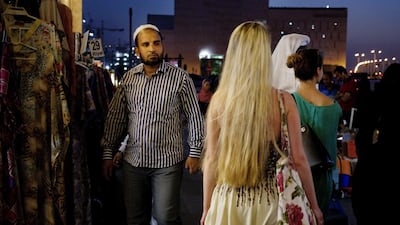DOHA // Mariam Saleh avoids malls and outdoor markets on the weekends because the low-cut tops, sheer dresses and miniskirts that foreign women wear reveal much more than she would like her impressionable young children to see.
Ms Saleh is part of a campaign in Qatar that was spurred by locals who are fed up with the way many tourists and visitors dress. The campaigners say Qatar is, after all, their country, and they should not be the ones feeling uncomfortable because visitors want to show some skin or dress like they would back home.
The campaign is aimed at encouraging foreign women to dress more conservatively. However, it is not spearheaded by religious hardliners, but by moderate locals who are concerned that a steady influx of foreigners is threatening to uproot their customs and traditions.
The campaigners say they are mothers and wives, but also gatekeepers of Qatar’s Islamic society.
They began handing out flyers this week. They will set up booths next week throughout Doha, and plan to pass out more than 200,000 flyers to raise awareness about local sensitivities with slogans such as: “Leggings are not pants” and “If you are in Qatar, you are one of us.”
Children will be wearing the slogans on T-shirts, and men and women will be passing out traditional coffee, chocolates and roses along with the brochures.
The government is not involved in the campaign, which is being funded by volunteers, as well as a women’s business club in Qatar. The campaigners say it is a grassroots effort aimed at spreading information to foreigners rather than pressing for new laws or reforms.
Similar efforts to encourage people to dress more respectfully have taken place in other Arabian Gulf countries. In the UAE, Emiratis launched a dress code campaign in 2012. In Kuwait, a lawmaker is calling for a ban on public “nudity” — a reference to bikinis on the beach and at hotel poolside.
Qatar’s government, which benefits from tourism and foreign investment, is also not expected to enact any such laws.
Four years ago, concerned citizens launched a campaign called “One of Us” to encourage foreign women to cover from their shoulders to their knees, but the campaign had little effect on visitors who felt out of touch with Qatari society.
This time around the theme is “Reflect Your Respect.” The flyers that will be passed out have one central plea: “Help us preserve Qatar’s culture and values.”
“We’re not telling you not to dress up. Get dressed up, but with respect, with modesty,” businesswoman Suhaila Al Harab, a supporter of the campaign, said. “I’m coming to a conservative country. I have to respect the culture of this society. This is a sensitive society and one has to be considerate of this point.”
Speaking from her home in Doha, Ms Al Harab says her boys are inundated with Western movies, music and fashion trends. She says Qatar is used to foreigners and is ready to welcome people from around the world for the World Cup, but she is urging visitors to be open to learning and embracing new ideas.
“It’s very nice for a woman to dress modestly,” she said.
Most Qatari women cover their hair and wear abayas. Many also cover their faces.
British tourist Roger Maynard recently visited Doha’s old souq, or market, with his Spanish wife, who wore a sleeveless dress that came down to her knees. He said they were being careful not to dress inappropriately.
“I think when in Rome, you should behave like the Romans, and I think you should be conscious of the local culture, and I think it’s quite reasonable,” he said of the campaign’s request.
Like other Gulf states, Qatar relies on millions of foreigners to provide everything from the muscle to build high-rises to world-class experts to lead mega-projects. It is preparing to host one of the world’s largest sporting events, the football World Cup in 2022.
*Associated Press

